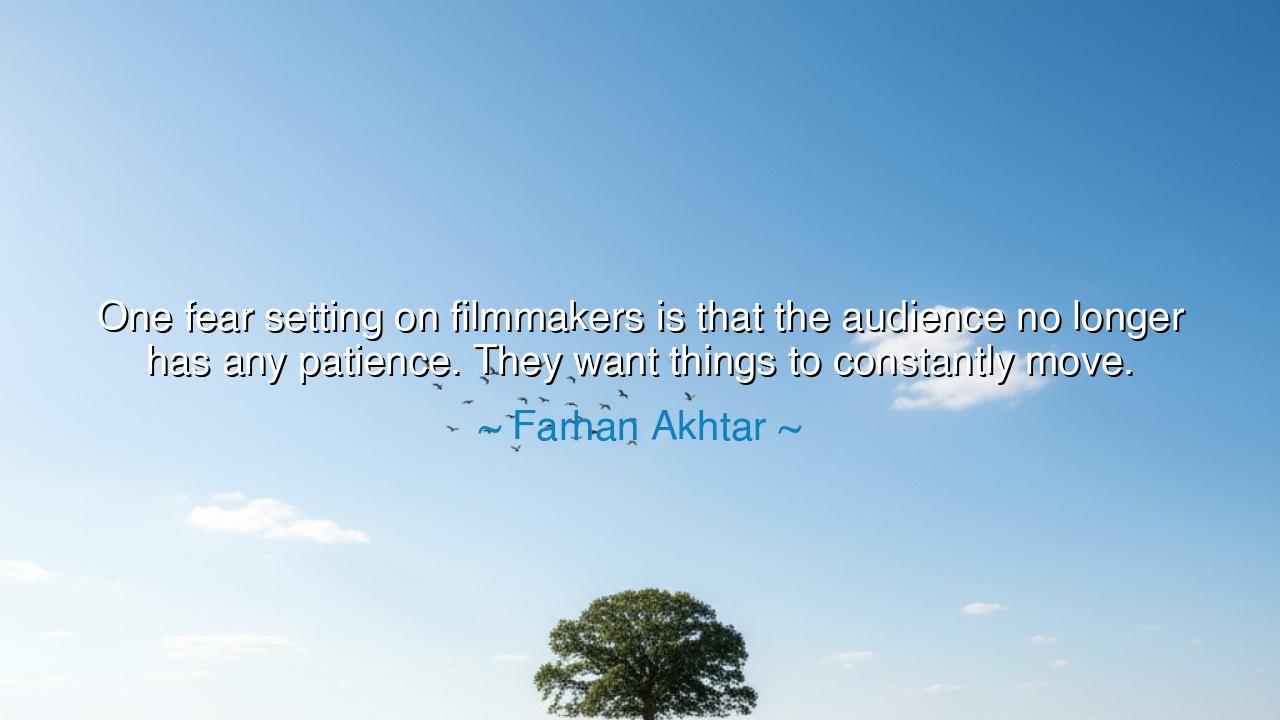
One fear setting on filmmakers is that the audience no longer
One fear setting on filmmakers is that the audience no longer has any patience. They want things to constantly move.






Hear the words of Farhan Akhtar: “One fear setting on filmmakers is that the audience no longer has any patience. They want things to constantly move.” In this saying lies not merely a concern for the art of cinema, but a reflection on the state of the human spirit in the age of haste. For the storyteller has always depended upon the listener’s willingness to linger, to dwell, to be carried slowly into the depths of meaning. But when the audience demands speed above all else, when they hunger only for unbroken movement, the sacred rhythm of story itself is threatened.
In the ancient days, tales were spoken by firelight. The elder would sit, and the tribe would gather, and the story would unfold like the slow rising of the sun. There were pauses, silences, spaces where the heart was left to wonder. The people did not cry for haste; they waited, knowing that the power of the tale lay as much in its silences as in its words. Akhtar warns us that this gift of patience may be slipping from our hands, that the world, intoxicated by speed, forgets how to listen deeply.
Consider the parables of Aesop, or the epic of Homer. These were not tales rushed through in frantic pace, but sagas told with care, often over days, where repetition and stillness carved the truth into memory. If the audience of that age had demanded constant motion, these works—etched forever into the human soul—might never have been born. So too with cinema: the lingering shot, the quiet moment, the silence that speaks louder than speech—these are the treasures that vanish when the demand for movement consumes all.
History shows us the danger of this hunger for haste. In the decline of Rome, the people demanded ever greater spectacles in their arenas—blood, speed, noise, distraction—while neglecting the deeper responsibilities of citizenship and virtue. The empire decayed, even as the crowds cheered. In this mirror we see Akhtar’s warning: that when the audience seeks only stimulation, and has no patience for reflection, culture itself weakens. For art does not merely entertain; it nourishes the soul, teaches the heart, and builds the strength of a people.
Yet Akhtar’s words do not condemn the audience, but call upon them to awaken. For the fear of the filmmaker is also a challenge: to craft works that remind people of the power of stillness, of the beauty that dwells in quiet. The great films and stories of every age are those that balance movement with rest, light with shadow, noise with silence. The artist must be brave enough to resist the tyranny of speed, to guide the audience gently into rediscovering their lost patience.
The lesson, then, is for both artist and listener alike. To the artist: do not abandon depth for the sake of restlessness. Hold true to the timeless rhythm of storytelling, where movement serves meaning, not the other way around. To the listener: resist the temptation of haste. Train yourself to wait, to breathe, to allow the story to unfold in its own time. For just as a seed must rest in the earth before it bears fruit, so too must a tale linger before its truth blossoms within you.
Practical wisdom flows from this. Read slowly, without rushing to the end. Watch films with openness to silence, and let the stillness move you as deeply as the action. Sit in conversation without the need to fill every pause. In these small practices, you will rediscover the forgotten gift of patience. And in doing so, you will not only honor the work of the filmmaker, but also strengthen your own soul against the chaos of constant motion.
Thus, let Akhtar’s words be a guidepost for generations: do not let the river of time sweep you away in unending haste. Remember that the deepest waters flow slowly, that the most powerful truths are revealed not in constant movement but in stillness. For it is in silence that wisdom speaks, and in patience that the heart learns to truly see.






AAdministratorAdministrator
Welcome, honored guests. Please leave a comment, we will respond soon